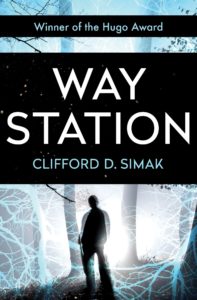 Way Station is a sci-fi classic from the 1960’s when we were all worried about nuclear war (not like today). One man who served in the American Civil War (Union side) grew up to become the caretaker of an interplanetary way-station located in his village. Various intelligent life-forms pass through there on their way to exploration and colonization of “our” particular arm of the Milky Way galaxy. Why? Something to do with limitations in faster-than-light travel – it’s not really clear. Just accept it.
Way Station is a sci-fi classic from the 1960’s when we were all worried about nuclear war (not like today). One man who served in the American Civil War (Union side) grew up to become the caretaker of an interplanetary way-station located in his village. Various intelligent life-forms pass through there on their way to exploration and colonization of “our” particular arm of the Milky Way galaxy. Why? Something to do with limitations in faster-than-light travel – it’s not really clear. Just accept it.
How, exactly did Enoch become caretaker of the Way Station? He just is, and has been since the Civil War, because as long as he stays inside the Way Station, he only ages an hour a year, so he’s still in his 30’s when we meet him in the mid-20th century, living alone in a isolated woodsy hollow somewhere kind of Appalachian-y. Despite limited education and experience, he is not bored.
A CIA agent has been watching him, for reasons unknown and the story initially shows promise as a mystery/thriller from the government’s point of view. I anticipated a Men In Black trajectory. But the POV abruptly switches to Enoch with tons of backstory about how his father built the Way Station shed and with help of Galactic Council engineers, turned it into an impenetrable fortress. That could have been a good story in itself, but is skipped over lightly.
Aliens come and go, all in wordy backstory. Most of them thrive in tanks of fluids, but also can stand up and walk and talk like humans when convenient. One of them dies and Enoch buries the body, but the body is later stolen from its grave, provoking a huge galactic crisis and the threat that the Way Station will be shut down. Angry villagers with pitchforks march on the shed.
Meanwhile, Enoch has been developing a map or spreadsheet of some kind using special alien mathematics, and it predicts with certainty that Earth will soon be destroyed by nuclear war. This concerns him.
In the end, the CIA inexplicably turns friendly, and after much mumbo-jumbo, all is well.
Structurally, the story is a collection of ideas without much coherence but with plenty of missed opportunities. The proposed ultimate solution to impending nuclear war, that humans could simply give up their machines and go back to clubs and spears to fight only “harmless” wars, is risible but contains the germ of an idea about how weapons technology is related to the rest of society. That would have been great to explore. Likewise, a “sensitive” deaf-mute neighbor girl who can operate alien machinery is a wasted character. Plenty of disappointments.
The main value of the story is to provoke the reader to “think big” (bigly?) about the place of human beings in the galaxy and to rise above petty grudges that can so easily lead us into to war and potential planetary annihilation. Can we be bigger than ourselves?
It’s a worthy theme (among many) but is surrounded by so many irrelevancies and what looks like plain old padding that the story became saddle-backed, speechy, and ultimately ineffective. However it is one of Simak’s two big hits, and he did win three Hugos and one Nebula, so it is obviously a crowd-pleaser. I was not really ‘pleased’ as much as not-offended.
Is it psi-fi, exploration of human consciousness? It does try to address the sources of human nature that lead us to interminable warfare, and the main character’s internal ruminations, while rambling and inconclusive, attempt to explore a human’s commitment to other humans, versus some grand abstract idea of galactic unity, but no strong message emerges clearly.
Simak, Clifford D. (1963/2015). Way Station. New York: Open Road Media, 228 pp.